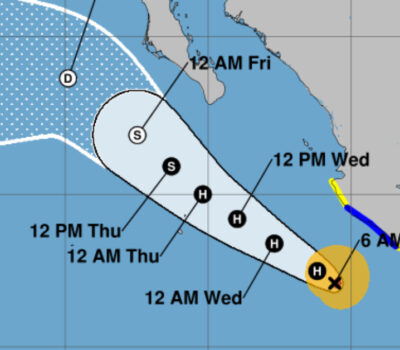A study by the Federal Ministry of Tourism (SECTUR) that analyzed the impact of climate change in 10 top tourist destinations in the country, points to Puerto Vallarta among the top three tourist destinations in Mexico unprepared to deal with a natural disaster. The other two are Veracruz and Boca del Rio.
Puerto Vallarta will be one of the most affected by climate change, according to a preliminary release of the State Plan of Action Against Climate Change (PEACC). It is estimated that in 2020 the temperatures in the area could increase 1.3C, which will cause weather phenomena’s, like rain and storms, to be more intense. “The hurricane seasons will become more active and more intense,” says the coordinator of PEACC, Mauricio Alcocer Ruthling, who agrees that Puerto Vallarta is not repaired to cope with climate change.
The absence of a plan to respond to a natural disaster makes Puerto Vallarta more vulnerable. Los Cabos, where damage from Hurricane Odile totaled more than 14 billion pesos, is better prepared by meeting seven of the 12 points measuring an areas readiness in the study. Puerto Vallarta only meets five points of readiness.
The Civil Protection Authority of Puerto Vallarta recognizes that they do not have adequate infrastructure and equipment that puts them at a greater disadvantage, and only basic functions of communication equipment for civil protection. “In floods the roads become impassable, 10 minutes of rain in the area is enough to affect them,” the Minister of Tourism report notes.
The Secretariat recommends that Puerto Vallarta authorities strengthen the regulatory framework, remove the coastal infrastructure risks, and curb the excessive urban growth, among other factors.
The director of environment and ecology of the city, Juan José Navarro Amaral, recognizes that progress is being made, “maybe not with the speed that it requires or how we should address the problem”.
José Ludwig Estrata, Regional Director at State Secretariat of Tourism for Puerto Vallarta, recalls that the vulnerability was demonstrated in 2002 with Hurricane Kena.
“It’s something we have worked on very closely with business leaders and NGOs,” he said. Through intergovernmental committees, they drive action for sustainability and climate change adaption.
A study by the Federal Ministry of Tourism (SECTUR) that analyzed the impact of climate change in 10 top tourist destinations in the country, points . . .











